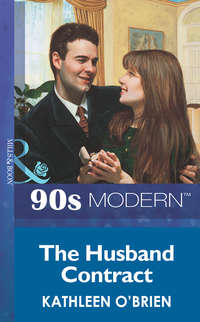
Полная версия
Happily Never After
Tom glanced at the water again and wondered how many degrees it was. If only he weren’t wearing his most comfortable old cords, he might actually do it. Between Darlene and O’Toole, this party was going down.
“Hey,” Darlene said, making the word two warm syllables with honey on top. Darlene’s body might be Botticelli, but her voice was pure Gone with the Wind. Still, her smile didn’t look right.
“Hey, there,” he responded carefully. He wondered if it was possible she’d heard Bailey’s comment about her lease expiring. Like all good old boys, Bailey did tend to boom a bit.
But would that be so terrible? Tom was going to have to end it soon anyhow. He didn’t want a trophy wife. He didn’t want a wife period.
Ten years ago, after the…fiasco…he’d decided his life needed some strict ground rules. He had no intentions of living as a monk, all hair shirts and no sex, but he did try to keep all his relationships clean and sweet and mutually satisfying. He’d been pretty successful, so far. That sixth sense about parties applied to love affairs, too, ordinarily.
“I stopped by the apartment on my way over here,” she said.
He tried not to react to her word choice. The apartment, she said these days. Not your apartment. It was just one step short of our apartment, and it was a big mistake, though she obviously didn’t know it.
“I got Otis to let me in,” she added casually.
He wasn’t sure why that shocked him so much. Otis was the seventy-year-old doorman, and he was drooling in love with Darlene. Otis would probably agree to let her into any apartment in the building, even if she were carrying a metal detector and a large black sack.
Tom supposed he was shocked that Darlene would take advantage of the nice old guy like that. Whatever the reason, his smile felt tight.
“And why did you do that?”
“I’d left my driver’s license next to the sofa,” she said, and he had to admit she told the lie beautifully. “Anyhow, I also picked up the mail for you. I knew you’d been waiting for that transcript.”
“Really. Was it there?”
“No.” She lifted her gold clutch and opened it deftly. “But this was.”
She held out a small pink envelope. Immediately he caught the cloying scent of gardenias.
Damn it to hell. He had hoped he’d never see another one of these. But even if he had to, he wasn’t supposed to get it yet. Not for another week.
Could it possibly be a coincidence?
But he knew it wasn’t.
He knew it was Sophie.
As always, he felt his lungs tightening, as if they wanted to reject the sickeningly sweet smell. Or was he just trying to reject the idea that Sophie had sent him another “anniversary” card? Every year he told himself that surely this would be the last. She’d forget, she’d lose interest, her therapists would finally convince her that it did no good, especially since he never responded.
It had been ten years now. Ten years since he’d walked out of a church filled with these poisonously sweet white flowers. Ten years since he’d walked out on Sophie.
But she’d never forgotten. And she clearly intended to make sure that he didn’t, either. Which was fairly ironic, actually.
Darlene pushed the card forward a fraction of an inch, and he realized he needed to do something. He held out his hand calmly and took it. He flipped it over, glanced at the return address just to be sure the gardenia smell hadn’t tricked him, then flipped it back to see whether Sophie had addressed his name the usual way, with a small heart where the O in Tom should be.
She had.
No wonder Darlene’s smile looked so tight and thin.
“Well?” She snapped her little gold clutch shut sharply.
“Well, what?” He slipped the envelope into his wind-breaker pocket, patted it to be sure it was secure, then zipped up his jacket against the fresh, high wind that hinted at a squall before sunset.
Darlene paused, her mouth half-open. She obviously knew the next few moments were dangerous and was looking for the right words.
“It’s really too cold for a boat party, don’t you think?” He hunched his shoulders. “But I guess Saroyan couldn’t wait till spring to show off his new baby.”
In his head Tom begged Darlene to be very careful, to take the conversational fire exit he was offering. He didn’t like being cornered, and she’d gone too far when she’d pawed through his mail. And he damn sure didn’t want to talk to her about Sophie.
If she forced him to do this now, he might say things he’d regret.
She wasn’t great at reading his thoughts, though, and he knew his face revealed only a tilted smile and a slightly sarcastic arch to one brow. It was an expression he’d perfected over the last decade.
The arched brow probably tipped her over the edge. Darlene had odd moments of self-respect, and though she might let a man cheat on her, she wouldn’t stand for being mocked.
“Who exactly,” she demanded, “is this Sophie Mellon?”
What a stupid question. What did it matter? When a love affair was over, did it make any difference exactly what, or who, had killed it?
When he didn’t answer, Darlene’s jaw tightened. “So far I know this much. She writes your name like a lovesick adolescent, and she soaks her cards in cheap perfume. Things haven’t been right between us lately, Tom. Is this why? Is she someone I should worry about? Or is she just a—”
A what? Darlene seemed to understand she’d gone too far, but the echo of the unspoken thought seemed to hang in the air between them. What word had she been going to say?
And what was the right word, anyhow? What was Sophie? Slut? Stalker? Psycho? Maybe all those labels applied. And many more, as well.
Maybe the best word was cursed. Poor beautiful, tormented Sophie was cursed, and still she signed his name with a heart.
Suddenly Tom realized he was furious. If Darlene insisted on doing this right here, right now, he was ready. He felt his smile tilt another inch. It probably looked like a smirk by now. He didn’t give a damn about that, either.
“Sophie Mellon is the woman I almost married.”
“What?” Darlene’s eyebrows knitted hard. “Married? When?”
“Ten years ago.”
She shook her head, looking confused and slightly annoyed. She looked, he thought, like an infant rejecting an unappetizing spoonful of strained peas. “But surely…” She took a breath. “If that’s true, why—why didn’t you ever tell me about it?”
“It wasn’t important.”
Her chin went up. “Wasn’t important?”
He shrugged. “Not to you.”
That was rough. Two circles of hot pink broke out on her skin. But her chin didn’t waver. She was a strong woman, and a distant part of Tom admired her. Maybe she was strong enough that, someday soon, she’d thank him for setting her free.
“When you say you almost married her… What does almost mean? How close did you come?”
“Close enough to hear the wedding bells at my back as I drove out of town.”
“My God. You mean you left her waiting at the altar?”
“No,” he said, still smiling. “Technically, that’s what jilted grooms do. I believe the bride waits in an anteroom off to the side until her husband-to-be shows up and takes his place.”
She hesitated. “But you didn’t. Show up, I mean.”
“No.”
The pink cheeks had faded, leaving behind an ivory pall of shock. It was finally sinking in. Her gaze scoured his face, as if she wondered where her charming Tom had gone.
He wouldn’t be receiving cards from this one for the next decade, that was sure. Good. One tearstained ghost, annually rattling the rusty chains of his ruined conscience, was enough for any man.
She swallowed. “But why? Why didn’t you go through with it?”
For the first time, he hesitated, too.
“Let’s just say…I decided I’d make a rotten husband.”
Amazingly, she balked at that. She wasn’t ready to let go of all her illusions—or her plans.
“Oh, Tom,” she said, reaching out with gentling fingers. “Honey. Don’t say—”
He backed up a quarter of an inch and restored his tilted, insulting smile. “Why not? It’s true—I’m not good husband material. I think I knew that the night I almost screwed her bridesmaid.”
A gasp. And then, as if by instinct, she reared back and slapped him.
It would have caused quite a stir, except that, at the exact same moment, Trent Saroyan shoved Coach O’Toole over the yacht’s elegant teak railing and into the Atlantic Ocean and, as Tom had predicted, all hell broke loose at the party.
THOUGH IT WAS ONLY about eleven-thirty, the darkness out here in the rural Georgia woods was cool, deep and damp, the kind of night that predicted pea-soup fog in the morning.
Kelly stood at her worktable, so absorbed in cutting a very expensive sheet of purple drapery glass that she listened to the muffled twig-cracking sound several seconds before she realized it was the wrong sound at the wrong time. Most of the little animals that shared these woods with her went to bed early—and few of them were capable of producing such big noises anyhow.
Carefully she put down the glass cutter and listened. The sounds continued, quite close now.
It was probably nothing. Maybe something bigger than usual, like a deer, had wandered into her yard.
Still, a shiver of fear shimmied through her.
She stared at the studio window. She couldn’t see anything, of course. Nothing but her own reflection. The old, warped glass distorted a lot, but she still saw a skinny, scruffy redhead with a sad, wide-eyed face.
A sudden heavy, muffled thud came from just beyond the back door.
What was wrong with her? She couldn’t just stand here, frozen. When she’d bought this old place for her stained-glass studio three months ago, her ex-husband Brian had warned that she’d be a nervous wreck way out here with no neighbors. She hadn’t been, though. She’d done fine until two nights ago, when Lily had…
When Lily had died.
In the long, painful forty-eight hours since then, Kelly had been reduced to a mass of singing nerves and emotional confusion. Tears were never more than one thought away. And fear, too. Not active terror, but a shadowy sense that the world was not benign, or even neutral, but was instead somehow malignant, just waiting for you to make a mistake it could exploit.
Like Lily, who’d rushed through life and had never wanted to stop for boring maintenance chores, like putting brake fluid in an aging car.
Or like Kelly, working alone late at night in a falling-down studio with no locks on the doors.
The doctor who’d seen Kelly that night had assured her this reaction would be quite normal. He had prescribed sleeping pills, which she didn’t take, because they seemed to open the floodgate to dreams. She turned to her work instead. She had several commissions to complete in the next weeks, and besides, the precision and focus required calmed her. The careful piecing together of small, seemingly random shapes, which came together to create a coherent whole, comforted her. Stained glass, she realized, was a pretty good analogy for life.
It had only been two days, she reminded herself. The funeral wasn’t even scheduled until the day after tomorrow. Eventually, she’d find her equilibrium again. For now, she just had to force herself to pretend a courage she didn’t really possess.
Though she’d been cutting without her work gloves on—one of her habitual sins—she quietly reached over, opened her drawer and slid her right hand into the soft, protective leather.
Then she picked up the freshly bisected sheet of glass, which came to a lethal point at the tip, and walked to the back of the studio.
She adjusted her grip on the glass. Her heart was beating so hard she could feel her pulse in her fingertips. Slowly, she opened the door….
And found herself looking into the shining black-marble eyes of a raccoon, who had somehow managed to climb to the very top of her three-tiered plant stand and was trying to reach the bird feeder that hung from the soffit.
The poor thing looked mortified, just as frozen into his awkward position as she had been moments earlier. He was huge, with a fat, sprawling belly that suggested this wasn’t his first late-night raid. The long gray streamer of moss that dangled from his ear proved he had tried other approaches first.
One of the branches of the nearest oak came within six feet of the bird feeder. That must have been the thud she’d heard. The little scavenger had jumped and missed.
His stricken gaze seemed to be asking her to pretend she didn’t see him. Smiling a little, she turned her head away. She wasn’t even sure raccoons ate seeds, but if he wanted them that badly, he could have them. She could refill the feeder for the birds in the morning.
It was time to go to bed. She put her hand on the doorknob.
Someone touched her shoulder.
Electric currents of panic shot, primal and unwilled, through every vein. Her right arm came up.
“Kelly?”
“Jacob?” The sudden withdrawal of adrenaline left her limbs weak. With a loud exhale, she slumped against the door, just under the bare bulb that served as an entry light.
“God, Jacob,” she breathed.
Thankfully she’d recognized the voice before she’d had time to slash out with the glass. As it was, she had already raised it to breast level.
Jacob Griggs, Lillith’s husband, looked down at her makeshift weapon, but it didn’t seem to frighten him. He seemed beyond caring that he’d come within six inches of being impaled on a dagger of cut glass.
“I scared you,” he said heavily. He looked up at her. “I’m sorry.”
He looked horrible. His face was gray, but his eyes were small and red-rimmed inside puffy circles of grief. His hair, normally so thick and shiny Lillith had rarely been able to keep her fingers out of it, seemed to have dulled and thinned almost overnight.
“It’s okay,” Kelly said. She took his arm, and realized it was shaking. Two days ago, Jacob had been a thirty-five-year-old lawyer who jogged and played racquetball and danced and gave great parties, and generally made every woman in Cathedral Cove jealous of Lillith. In forty-eight hours, he had turned into an old man.
But what was he doing here at nearly midnight? She looked into those eyes again and wondered if he even knew where he was.
“Jacob, do you want to come in?”
He just stared at her.
She squeezed his hand. “Did you need to talk?”
To her horror, he began to cry. His face twisted with the agony of trying to hold it back. “I don’t know,” he said. “I don’t know.”
“It’s okay,” she said. She put her arm around his waist, though he was a full five inches taller. She wasn’t sure he wouldn’t collapse.
He was still repeating the same broken words. “I don’t know, I don’t know,” he moaned.
“What is it? What don’t you know, Jacob?”
He shook his head, back and forth, back and forth.
“I don’t know anything,” he said. His lips were dripping with tears. Finally he groaned and bent over double, his hands on his knees, like a runner pushed beyond endurance. “I don’t know how to live without her.”
CHAPTER THREE
IMOGENE MELLON HAD LONG AGO stopped believing in justice.
Maybe, she thought as she slowly descended Coeur Volé’s wide, twining staircase in the predawn hours, that had happened on her wedding night. The longest night of her life.
The night she’d discovered her handsome, socially prominent husband wasn’t normal.
Well, maybe she should choose another phrase. In Imogene’s youth “not normal” had been a euphemism for homosexual, and lots of young women had no doubt found themselves married to men who were merely looking for camouflage. Imogene believed she could have lived with that. At least then, maybe she and Adler might have learned to be friends.
Instead she had discovered that Adler liked women just fine. He specifically liked to hurt them. Nothing too dramatic. Nothing that left marks or required care. He’d called it “spicing things up.” He’d implied that if you peeked into any bedroom in town you’d find a few of these “toys.”
It made him extremely potent. By the end of her first week of marriage, Imogene was pregnant with Sebastian. A year later, Sophie was conceived. After that, Imogene took birth-control pills secretly for several years. When Adler found out, he broke her wrist, and two months later she was pregnant again, with Samantha.
Her beautiful babies, almost all of them conceived in undignified tableaux of sadism and pain. Still, the children should have been her consolation, her reward for enduring without complaint. And they were, for a while. Then, gradually, she’d begun to understand that they weren’t normal, either.
So much for justice.
She reached the wide staircase landing now, and, as she did almost every morning, she paused to appreciate the way the rising sun lit the huge stained-glass window. She liked to watch the figures come to life. It made her feel less alone in this haunted mansion.
Jean Laurent, the French artist Adler had hired, had done a magnificent job. The twenty-by-twelve window of St. George slaying the dragon had bold colors and great drama.
The dying dragon dominated the bottom third of the window, his sinuous body curled around the feet of the knight, his scales shining like peacock feathers. Up from the dragon, St. George rose like a human tower, tall and triumphant. He lifted his sword into the air, and on the tip of the sword he had impaled the dragon’s glowing red heart.
It was not any failing of Jean Laurent’s talent that caused Imogene to identify more with the dragon than with the resplendent knight. After all, from ground level, the dragon was mostly what one saw. And, naturally, Imogene couldn’t help comparing the handsome St. George to the handsome Adler Mellon. St. George seemed to be enjoying his kill a little too much.
Imogene sometimes wondered whether Jean Laurent might have liked the dragon best, as well. The artist had spent so much time and empathetic energy on the dragon’s face. Its eyes were almost human—green, gray, silver and blue pools of inarticulate misery.
It took about twenty minutes for the sun to climb high enough to illuminate the entire window, but Imogene always waited patiently for the transformation to complete itself. The heart, naturally, was the last to burst into brilliance. The red, jewel-like heart, so real it seemed to be still throbbing.
Imogene had asked Jean Laurent if the window had a name, like any other work of art. He had smiled and turned to Adler with a bow. Coeur Volé, Jean had said. Of course.
Another reason to think perhaps Jean had sympathized with the dragon.
Coeur Volé was French for Stolen Heart.
“Mom?” Samantha was standing about ten steps above her. She still wore her nightgown. “Are you all right?”
“I’m fine,” Imogene said. What a ridiculous question. Of course she wasn’t all right. She was dying. They had told her she had maybe a month or two, no longer. “I’m fine. Go back to bed.”
“Do you want some breakfast?”
“No.”
Still Samantha hesitated, her hand on the banister. “Do you want anything?”
I want to live.
And I want justice. For my own tormented body, and for the poisoned lives of my children.
She let her gaze leave the agonized eyes of the doomed dragon. She let it slide up the shining armor, through the muscular thighs and powerful shoulders, and into the lusty, inflamed eyes of St. George.
Yes, she thought, feeling something stir in her own loins, finally. This, here at the very end, was what she wanted.
I want, for once in my life, to be the one holding the sword.
TOM HAD A BAD TASTE in his mouth, and it wasn’t from the salmon salad, which he ordered every time he came to this restaurant and which had been as delicious as ever.
The taste came instead from the conversation, especially his part of it. His words had a sticky, artificial after-taste. The hard-to-digest flavor of manipulative half-truths and sugarcoated threats.
From the minute Coach Mick O’Toole had been fished out of the ocean, red-faced and spluttering and flailing his arms wildly, splashing everyone on the boat with salt water, Bailey Ormonde had made it clear that it would be Tom’s job to make sure the man didn’t sue.
Thus, this hastily arranged lunch with O’Toole, who hadn’t even had the sense to bring his own lawyer.
Tom knew the drill. There wasn’t much O’Toole could really do to hurt Saroyan, even if he did decide to sue. People like Saroyan paid big bucks to Ormonde, White and Murray to do what they euphemistically called “asset-protection planning.” That was Murray’s specialty, and he was good at it. Saroyan could pretty much get drunk and run down a convent full of nuns with his SUV, and, though he might do time in the slammer, he’d emerge as rich as ever.
One soggy football coach claiming whiplash didn’t have a chance. But he could annoy and embarrass Saroyan, who had a very thin skin. Saroyan didn’t want a nuisance lawsuit that would keep this unfortunate anecdote alive at every party for the next year. As he’d said during their meeting yesterday, “Goddamn it, boy, just make it go away.”
Considering that Saroyan was only about ten years older than Tom, and had earned every penny of his fortune buying up slums in Atlanta and then painting over the rotten buildings and raising the rents, that “boy” comment had annoyed the hell out of Tom.
Still…this was his job. Bailey always said lawyers were actually diplomats. More like gymnasts, was how Tom saw it. He’d just spent the past hour kissing O’Toole’s dumb ass while twisting his arms back and tying his hands.
He ordered coffee to help with the foul taste in his mouth.
“You know, I’m used to tempers,” O’Toole was saying. He adjusted his neck brace, which did look damn uncomfortable. “Try coaching a bunch of college kids, and you’ll learn about tempers, that’s for sure. The real problem with Saroyan is that he doesn’t understand football. And if he thinks he’s going to call the plays on the field, he’s got another think coming.”
Tom considered giving O’Toole a little friendly advice, but then he looked at that thick neck and those beady eyes, and he decided to have another sip of coffee instead.
“Saroyan didn’t even play football when he was at MGU. He was a math major.” O’Toole said math as if it were something ridiculous, like majoring in tiddlywinks. He didn’t seem to see the connection between Saroyan’s studies and his ability to buy and sell O’Toole ten times a day.
Tom drained his coffee and tilted his watch under the table. Fifteen more minutes of this, at least, before he could check his watch openly, gasp and imply that he’d been enjoying himself so much he’d lost track of the time.
Diplomat? Gymnast? Babysitter might be more accurate. Ego babysitter. He tried to tune out the little voice that said this was nothing a grown man should be doing for a living.
Suddenly, his cell phone began to vibrate. Apparently there was a God.
Giving O’Toole a “gosh, isn’t this annoying, just when we were having such a good time?” smile, Tom unclipped his phone and answered without even bothering to look at the caller ID. Ordinarily he screened, having just enough old girlfriends to be cautious, but right now he’d welcome a call from any one of them.
“This is Tom Beckham,” he said formally, already folding his napkin and crooking a finger to let the waiter know it was time for the check. Whoever really was on the other end of this telephone, as far as O’Toole was concerned, it was urgent firm business.
At first there was just silence. And then he heard a soft female voice.
“Tom?”
For about six tenths of a second he honestly didn’t recognize the voice. And then it hit him. Hit him hard.
It was Kelly.
An image rushed toward him, leapfrogging the years. An image of the two of them in a dark corner, laughing at first, and then touching, and then she was crying, and he was up against her, and she was kissing him and whispering his name, but crying, crying the whole time.









